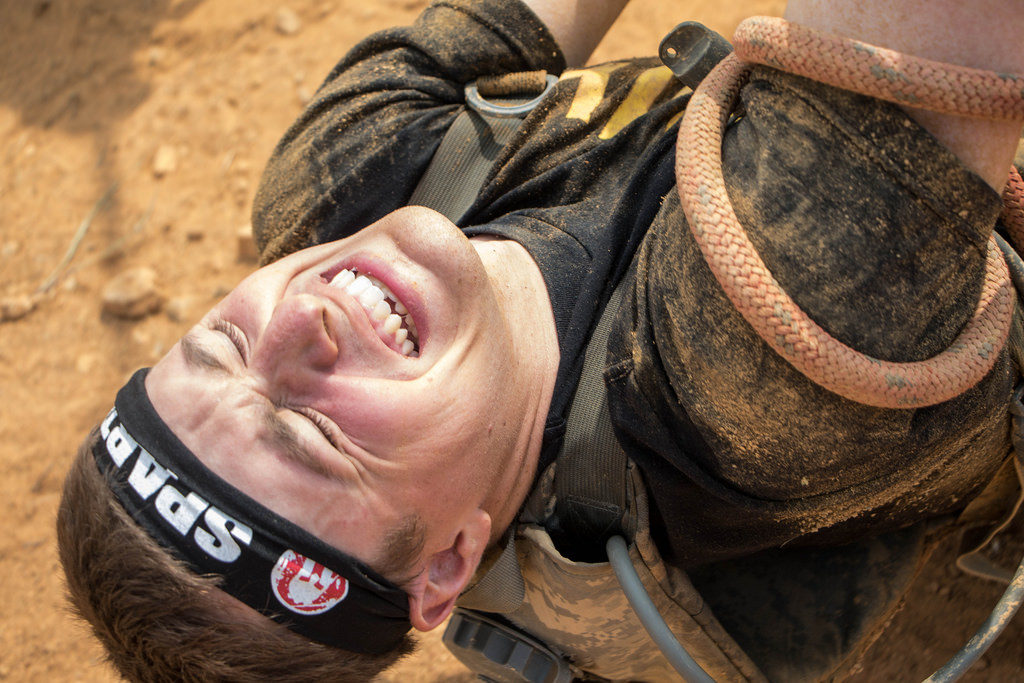
Sometimes we learn from people who model what we want. Other times, we learn from those who model what we don’t want!
In my previous post, I discussed someone who falls into the latter category: a guest on the TV show This Time Next Year who justified her inability to find love by claiming that “Men don’t want to commit” (Once again, using myself as counter-exhibit A, I’ll borrow Amy Poehler and Seth Meyers’ one-word catchphrase: Really!?!) This time, I’m using another counter-example from the same show (which really is a great, inspiring show 99% of the time — I promise!) to address one of the most pernicious attitudes out there: “No pain, no gain.”
As part of this guest’s intention to lose weight, she competed in a “Spartan Super” (a “Tough Mudder”-style race with 25+ obstacles over 8+ miles). In the midst of the grueling event, she threw up, prompting a man videotaping her to say, “It wouldn’t be a race if you didn’t throw up.”
Actually, it would.
Believe it or not, it is possible to get in shape, reach your goals, feel good about yourself, and even engage in healthy competition without prompting a violent, adverse physical reaction. Yet this well-meaning videographer seems to operate under the zero-sum-game worldview that gain has to be offset by an equivalent amount of pain. If that’s working for him, great, but it’s definitely not the way I want to live my life.
Another common example of this mindset is the slogan “Pain is weakness leaving the body.”
Actually, it isn’t. It’s your body sending you a message that you’re doing something harmful to yourself.
Now, I’m not talking about the sort of “pain” that could be more accurately characterized as discomfort, such as what you experience when you stretch slightly beyond your comfort zone (the positive experience of eustress); I’m talking about detrimental suffering. Continuing this kind of self-harming behavior simply doesn’t make sense. Think about it:
- If every time you ate a certain food, it gave you a horrible stomach ache, would you keep eating it — telling yourself, “That pain in my stomach is just weakness leaving my body”?
- If you were in an unhealthy (or even abusive) relationship, would you “tough it out” — telling yourself that staying in the relationship is making you stronger? (Unfortunately, many people answer yes to this question.)
- If you were hitting your head with a hammer, would you keep on doing it — telling yourself that you’re driving out the weakness from your head?
Obviously, I’ve chosen examples that are fairly extreme and pretty ridiculous (especially the last example, inspired by my dad’s oft-repeated expression: “It’s like hitting yourself over the head with a hammer — it feels great when you stop!”). But to me, they’re no more ridiculous than thinking that puking during a race makes it more beneficial to you. Or that making yourself sick somehow makes other people (or yourself) healthier. Or that making yourself miserable somehow makes other people happier. Or that suffering is inherently virtuous.
So please, do yourself, your loved ones, and the entire world a favor: stop doing things that cause yourself unnecessary pain and suffering. You’re not creating a better life or a better world. You’re just creating a world of pain.
Trust me: it is possible to feel good, reach your goals, and enjoy the journey…without puking! (In fact, the better you feel and the more you enjoy yourself, the more likely you are to reach your goals: According to a study reported in Jon Acuff’s book Finish, “picking something you enjoy…increases performance success by 46 percent.”)
And when you do what you love and love what you do, you radiate that love to everyone around you. You inspire others while reaping benefits in your own life. And you help create a world of “no pain, no pain.”
